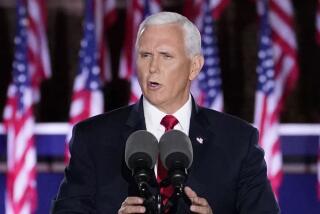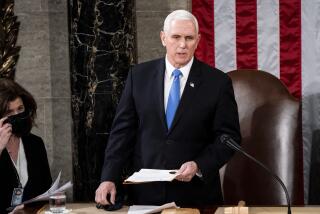Trump administration threatens to punish Turkey unless it frees detained American minister
- Share via
Reporting from Washington — At a conference Thursday affirming the U.S. commitment to global religious freedom, Vice President Mike Pence threatened economic sanctions against Turkey if its government fails to release an American minister being held there.
Pence denounced Turkey’s 2-year-long imprisonment of Protestant minister Andrew Brunson and threatened to impose harsh economic sanctions on the government of President Recep Tayyip Erdogan if Brunson is not freed.
Brunson was released from Turkish prison this week but placed under house arrest. Turkey accuses him of having a role in a failed 2016 military coup that led to a government crackdown that has jailed thousands of people.
President Trump later echoed Pence on Twitter, saying Brunson was “a great Christian, family man and wonderful human being” who was “suffering greatly.”
“This innocent man of faith should be released immediately!” Trump wrote.
Trump said his government would impose “large sanctions” on Turkey, but gave no time frame or other details.
Pence called the matter an example of the kind of religious intolerance that the U.S. wants to end.
“Those nations that reject religious freedom breed radicalism and resentment in their citizens,” Pence said. “They sow the seeds of violence within their borders — violence that often spills over into their neighbors and across the world.”
His comments came at a State Department conference on religious freedom, which has become the centerpiece of the Trump administration’s focus on global human rights, sometimes to the exclusion of other areas, such as reproductive or gay and lesbian rights, critics say.
Citing what he called Trump’s “unwavering commitment” to religious freedom, Secretary of State Michael R. Pompeo said the right to worship without persecution “is a fundamental American liberty” that the administration seeks to promote internationally.
“The United States advances religious freedom in our foreign policy because it is not exclusively an American right,” Pompeo told the conference. “It is a God-given universal right bestowed on all mankind.”
The three-day conference, held at the State Department with dozens of international delegations in attendance, wrapped up Thursday. State Department officials had repeatedly declined reporters’ requests for a list of attendees until the final day. Though billed as a ministerial-level conference, many delegations were represented by ambassadors stationed in Washington.
Several sufferers of religious persecution, including a Yazidi woman who escaped capture by the militant group Islamic State, also attended and testified.
Among countries that Pompeo singled out for criticism was Myanmar, also known as Burma, where the military has committed what the State Department calls ethnic cleansing of thousands of Muslim Rohingya.
He announced a State Department program that will bring to the United States foreigners “working on the front lines” of religious rights for workshops, training and other support.
Pence cited the repression of Tibetan Buddhists and Muslim Uighurs by China; North Korea’s “unyielding, systematic and often fatal” abuse of Christians; attacks on Jews in Europe; and persecution of all faiths in Iraq and elsewhere by Islamic State.
Pence gave special attention to a newer problem: Nicaraguan President Daniel Ortega’s deadly attacks on the Catholic Church in the Central American nation. More than 300 people have been killed in Ortega’s crackdown on anti-government protests over the last several months.
Mick Mulvaney, director of the Office of Management and Budget, who spoke Wednesday, accused the Obama administration of using “our U.S. taxpayer dollars ... to discourage Christian values” by withholding financial assistance from countries that ban abortion or gay marriage. Human Rights Watch, among other groups, condemned Mulvaney’s comments as a “false narrative” to promote the administration’s conservative agenda.
Several conservative speakers suggested that laws that protect the rights of gays and lesbians impose unfair restrictions on practicing one’s religion.
Those comments brought rebuke from several activists.
“You can never gain religious freedom by violating the religious and human rights of others,” said the Rev. Patricia Ackerman, director of the Ethics of Reciprocity Project, which advocates on behalf of the gay community.
Other complained that by “doubling down” on religious freedom, the administration was neglecting other important human rights.
“How much room do you have to focus on other things,” said Jeremy Kadden, senior international policy advocate for the Washington-based Human Rights Campaign.
Sam Brownback, the U.S. ambassador at large for international religious freedom, has said that the emphasis on ending religious persecution will impact a variety of human rights.
“This is a foundational human right,” Brownback said last month when he announced plans for the conference. “You do religious freedom, and a whole series of better human rights come out of it.”
For more on international affairs, follow @TracyKWilkinson on Twitter
More to Read
Sign up for Essential California
The most important California stories and recommendations in your inbox every morning.
You may occasionally receive promotional content from the Los Angeles Times.














